Hammer Time: Aberrations
Last night I sold a car. Not just any other vehicle but the ‘family’ vehicle. A 2003 Honda Civic Hybrid that I purchased three years ago for $6500. For 50,300 miles it proved to be a perfect fit for a family of four. My wife loved it. But with used car prices outperforming in a three year period what the Dow couldn’t attain in ten I decided to cash it in. The price three years and 50k later? $6450.
I wasn’t smart when I got that price last night. I was lucky.
So were a lot of other people. I posted an article about a month ago about how used cars are in the midst of a bubble. There are a lot of ‘symptoms’ that people see as causes. The lack of new car purchases. A ‘new frugality’ driven by media fashion and economic need. The death of nearly a dozen car brands that made the bulk of second-rate products over the last fifteen years.
But there is one other ‘big’ thing that is stirring all of it up. Credit.
A lot of you are already familiar with the consumer credit so I’ll make it brief. Credit scores have declined considerably and with that obviously comes a delay to ‘access’ the credit needed to buy a new car. Some may be able to buy a car in a few years when their credit report improves. Others may take seven or ten years to get back in the good graces of the banks and finance companies that make up today’s auto loan market.
OK, that’s all nice and gloomy. But here is how it effects the used car market.
Today a lot of these folks who had bought new or CPO are now buying their vehicles through buy–here–pay–here lots (BHPH). The average payment at a BHPH lot is now around the $85 a week level. In otherwords, the payments have not gone down for most car buyers at all. Just the type of car they can get access to and the type of company willing to finance them.
That new Saturn a few years back has been replaced with a five year loan on a six year old Chrysler PT Cruiser. I’ve seen these vehicles have overall payments of $15,000+ out the door. That is given that the poor soul in question pays the thing off (about a third don’t).
A long term ‘manageable’ weekly payment is all a lot of these paycheck to paycheck folks are looking for. Until their credit situation improves these working class folks will remain firmly in the used car market.
The consumer credit conundrum would usually get solved with improved credit scores and increased risk taking by sub-prime auto finance companies. This is what happens in a typical market. However there is an even bigger monolith standing in the way of that outcome happening anytime soon.
The small business credit market.
There have been countless studies that have attributed economic recoveries to small business development. The fellow who gets laid off from corporate America may have to go it alone to survive. If he succeeds, then chances are he can grow and build his business while creating jobs in the process. To make that happen he needs one thing.
Capital. Without access to loans he can’t scale the business and hire people. No credit means no job growth, which means that John Q Downsized will not be buying any shiny new Lincolns in the next few years. Or as they say in the academic world.
“Although credit analysts have long advocated securitization of small business loans, pools consisting solely of SBLs have been rare. Despite this, small businesses have found ways to access the broader credit markets through securitized real estate, credit card, vehicle, and other loans.
Diversification often reduces the vulnerability of small businesses to disruption of any single source of credit, whether from banks or segments of the broader credit markets. While diversification of credit sources has some benefits, it cannot completely shield borrowers from a widespread financial crisis. In the recent crisis, funding from banks and the broader credit markets were both disrupted. To the extent that smaller businesses had become more connected to the broader credit markets, they may have faced tighter credit conditions than their medium-sized counterparts. Moreover, to the extent that corporate bond markets returned to normal after the crisis, the credit disruptions faced by many large businesses ended sooner than the disruptions faced by small businesses. Recognition of the particular vulnerabilities of small business to financial crises is vital if we are to develop effective credit maintenance policies, such as public loan guarantees.
Note: Attributed to James Wilcox, professor of economics and finance at the Haas School of Business, University of California, Berkeley… taken straight from this site
This is just a really nice way of saying that friends, family or habitual speculators aren’t going to be able to help the small businessman out. More importantly, don’t expect the banks to regardless of what bountiful gifts are given to them by the powers that be.
So I guess the next stop for those needing access to a loan is… the title pawn… the cash advance store… perhaps the embryonic online loan sites between individuals. Unlike the junk bonds and CDO’s of times past (collateralized debt obligations), I don’t see any magic pill that will yield the resources needed to grow cash strapped businesses.
At some point the used car market will plummet down to Earth. Someone out there will develop the next financial instrument that helps America re-leverage itself with pride and confidence. But until that rainbow of hope leads to a pot of gold, don’t expect the average price of a used car to decline.
More by Steven Lang
Latest Car Reviews
Read moreLatest Product Reviews
Read moreRecent Comments
- Lorenzo Massachusetts - with the start/finish line at the tip of Cape Cod.
- RHD Welcome to TTAH/K, also known as TTAUC (The truth about used cars). There is a hell of a lot of interesting auto news that does not make it to this website.
- Jkross22 EV makers are hosed. How much bigger is the EV market right now than it already is? Tesla is holding all the cards... existing customer base, no dealers to contend with, largest EV fleet and the only one with a reliable (although more crowded) charging network when you're on the road. They're also the most agile with pricing. I have no idea what BMW, Audi, H/K and Merc are thinking and their sales reflect that. Tesla isn't for me, but I see the appeal. They are the EV for people who really just want a Tesla, which is most EV customers. Rivian and Polestar and Lucid are all in trouble. They'll likely have to be acquired to survive. They probably know it too.
- Lorenzo The Renaissance Center was spearheaded by Henry Ford II to revitalize the Detroit waterfront. The round towers were a huge mistake, with inefficient floorplans. The space is largely unusable, and rental agents were having trouble renting it out.GM didn't know that, or do research, when they bought it. They just wanted to steal thunder from Ford by making it their new headquarters. Since they now own it, GM will need to tear down the "silver silos" as un-rentable, and take a financial bath.Somewhere, the ghost of Alfred P. Sloan is weeping.
- MrIcky I live in a desert- you can run sand in anything if you drop enough pressure. The bigger issue is cutting your sidewalls on sharp rocks. Im running 35x11.5r17 nittos, they're fine. I wouldn't mind trying the 255/85r17 Mickey Thompsons next time around, maybe the Toyo AT3s since they're 3peak. I like 'em skinny.


















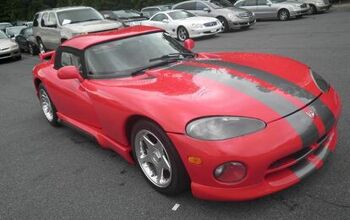
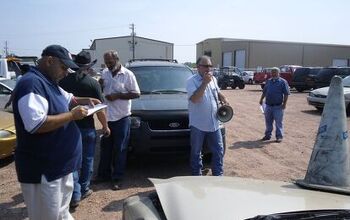
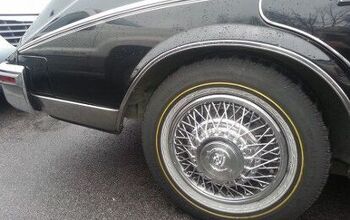
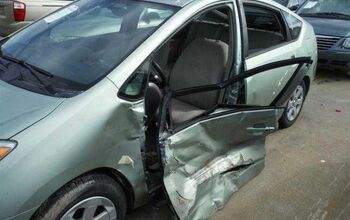








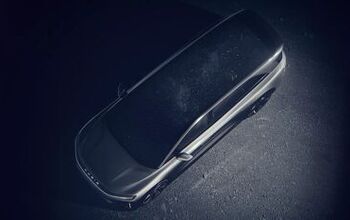


Comments
Join the conversation
Steve, Out of curiousity, how many miles did the Civic have on it? I'm guessing around 130K, based on what I've seen for sale on Autotrader.
Does this example from South Dakota count as being part of a used car bubble: http://www.murdofordmercury.com/show.aspx?vid=1780904 I didn't even know you could get financing on vehicles the dealer got for next to nothing.